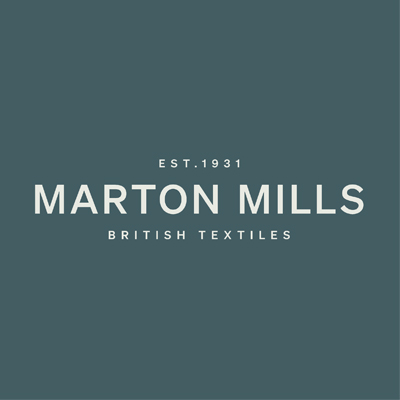
Marton Mills Co Ltd is a traditional family owned weaving mill in the heart of West Yorkshire. We have a vast range of stock supported fabrics and our in house design team offer a bespoke service to meet your exact requirements. Consistent quality and exemplary service has led to Marton Mills being the largest supplier of school wear fabrics in the UK. We also offer an extensive range of Tartan, Tweed and Melton fabrics. Our cloth is used in a wide range of applications throughout the apparel and furnishing industries.
As a family owned and managed business, pride and care is taken with every order to ensure the highest quality fabric is produced.
Marton mills has a workforce of highly skilled craftspeople, many of which have spent their lives in the textile industry, and is incredible proud of its loyal longstanding employees.
There are many complex processes involved in creating woven cloth, below is a brief explanation of each area of the mill and its processes:
Yarn Store
We hold a wide range of yarns in stock in a variety of compositions from pure wools to polyester/ viscose and in a variety of counts. We import several tonnes of top dyed yarn (fibres are dyed before being twisted into yarn) each month and package dyed yarn (yarn is dyed once in yarn state). Yarn is checked for quality and continuity of shade before it is used.
Warping
The yarn is prepared for loom by creating a warp (the threads that run from the front to the back of the loom). We have two warping machines, the Karl Mayer machine allows us to create small sample warps and short lengths and the VTA is capable of creating warps up to 1800m long for our larger bulk orders. To create a warp the threads for a single pattern repeat are arranged and checked on the creel by our skilled warpers. The threads are then wound onto the warping machine to the desired length, cut and tied up, the machine is then moved along and the threads are re-tied next to the first section, the process is repeated until the full warp has been created in this way. A warp can take anything from 2 to 11 hours to produce depending on its complexity.
Twisting
Once a warp has been created it needs to be readied for loom, there are two ways this can be done. Firstly, if this new warp is the same sett as a job that is already weaving in loom then the Twisters can knot the new warp to the end of the old warp, pull it through and it will be ready to weave again. This is the quickest way to get a warp into loom. However, if the warp is a new sett then a gear will need to be made for it and from this we use a Super Vega machine. The machine is programmed with the sett details for the job and it then threads each end through its correct shaft, reed gap and dropper. This can be a very time consuming job as some of our setts have over 7000 ends.
Weaving
Once the warp is prepared it is put into loom and this is where the fabric is created. Weaving is the process of lifting and lowering the shafts (and attached warp threads) in a given sequence to create a gap through which the weft thread is then placed. The simplest weave structure is plain weave where the weft threads go over and under alternating warp threads.
We have 20 looms including Dorniers, G6200 and G6300’s which are operated 24 hours a day 6 days a week and allow us to produce over 20,000 metres of cloth a week.
Mending
Once the fabric is woven it is then inspected for faults and passed through to the Burlers and Menders who rectify any faults or remove any contamination.
Finishing
We are joint owners of Roberts Dyers and Finishers. There are a variety of wet and dry processes that will transform the cloth from its greasy state into beautiful finished cloth. Some cloths require a lot of work in order to transform them from loosely woven cloths into fully covered meltons and others just need a wash to remove natural oils and machine grease.
Warehouse
The cloth is then returned to us for a finished inspection, the cloth is then either shipped straight out to a customer or rolled and held in stock by us for customers to buy in short lengths. We hold significant stocks of over 1000 different designs and offer next day dispatch.
Quality Control
Throughout every part of the manufacturing process quality is checked. This includes checking yarn shades, pattern repeat sizes, usable widths and weights of finished cloths and performing pilling tests to make sure the cloth lives up to expectations. Producing high quality fabric is our priority and the team work hard to continually improve our processes to ensure we produce the best cloth possible. We adhere to ISO9001:2008 standards.